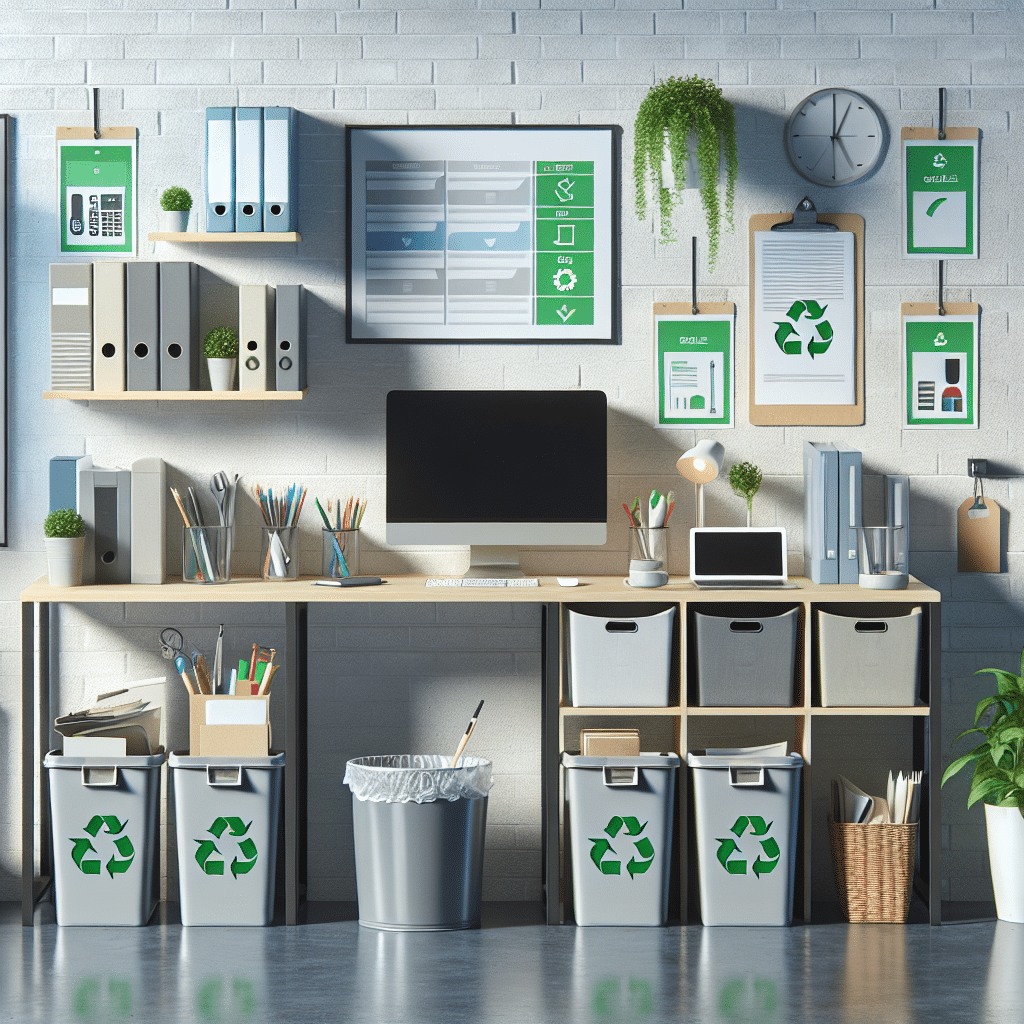
Table of Contents
Effective Waste Management Strategies for Office Consumables
In today’s world, where environmental concerns are more pressing than ever, effective waste management strategies for office consumables are essential for sustainability. Every office generates a variety of waste, from paper and packaging to electronic devices and food scraps. This blog post will provide you with practical and actionable strategies to manage your office waste efficiently, all while keeping the environment in mind. Let’s dive in!
Understanding Office Consumables
Before we get into the nitty-gritty of waste management, it’s essential to understand what we mean by office consumables. These items can include:
- Stationery: Paper, pens, markers, and more.
- Food and Beverage: Office snacks, coffee, tea, and disposable cups.
- Electronics: Old computers, printers, and hardware.
- Packaging: Boxes, bubble wrap, and packing tape.
Proper management of these items not only helps reduce waste but also can lead to significant cost savings for your business. So, how can you adopt effective waste management strategies for these office consumables?
1. Conduct a Waste Audit
A waste audit is an excellent first step in understanding the types and quantities of waste your office produces. It involves:
- Identifying Waste Sources: Look around your office and identify where waste is generated.
- Measuring Waste: Collect data on the volume of waste produced over a specific period.
- Categorising Waste: Sort the waste into categories – recyclable, compostable, and landfill.
This information will help you create a tailored waste management plan that suits your office’s unique needs.
2. Implement Recycling Programs
Recycling should be at the heart of your office waste management strategy. Here are some practical tips:
- Set Up Recycling Stations: Clearly label bins for different materials such as paper, plastic, metals, and electronics. Place them in accessible locations to encourage employees to dispose of waste correctly.
- Educate Staff: Conduct workshops or provide materials that explain what can and cannot be recycled.
- Partner with Local Recycling Firms: Work with companies like Brisbane South Skip Bins to dispose of recyclables responsibly. They provide services in Brisbane, Logan, and Ipswich, ensuring your recyclables are processed correctly.
3. Reduce Single-Use Items
Single-use items can contribute significantly to office waste. Here’s how to minimise them:
- Opt for Reusable Products: Encourage the use of reusable coffee cups, water bottles, and lunch containers.
- Digital Solutions: Reduce paper usage by adopting digital tools for notes, contracts, and communication.
- Conduct Awareness Campaigns: Motivate your employees to reflect on their consumption habits and make conscious choices.
4. Compost Food Waste
If your office generates food waste, consider starting a composting program. Composting can significantly reduce your landfill waste and provide nutrient-rich soil for gardening. Here’s how to get started:
- Set Up a Compost Bin: Designate a specific bin for food waste. Ensure it’s well-ventilated and located in an easy-to-reach area.
- Educate Employees: Teach your staff what items can be composted—fruit and vegetable scraps, coffee grounds, and eggshells.
- Partner with Local Compost Providers: Collaborate with local gardening clubs or organisations that can take your compost.
5. Safely Dispose of Electronics
Older electronics can pose a significant risk to the environment if not disposed of properly. Here are some tips for managing electronic waste:
- Establish an Electronics Recycling Policy: Create guidelines on how employees can recycle unwanted electronics.
- Work with Specialists: Collaborate with Brisbane South Skip Bins to manage the safe disposal of electronic waste in compliance with local regulations.
- Donate or Resell: If the electronics are in good condition, consider donating them to schools or charities, or reselling them for further use.
6. Monitor and Review Your Waste Management Strategies
Once you have implemented these strategies, it’s essential to monitor their effectiveness continuously:
- Track Waste Reduction: Use metrics to measure how much waste has been reduced over time.
- Gather Feedback: Solicit employee feedback on the waste management processes in place and make adjustments where necessary.
- Set New Goals: Once you achieve your initial goals, don’t stop! Set new targets for further waste reduction.
Final Thoughts
Effective waste management for office consumables is not just about following regulations; it’s about fostering a culture of sustainability in your workplace. By implementing these strategies, you can significantly reduce your office waste while promoting environmental responsibility among your employees.
Remember, an eco-friendly business is not only beneficial for the planet, but it also enhances your brand image and can potentially save you money in operational costs.
If you’re located in Brisbane, Logan, or Ipswich, consider reaching out to Brisbane South Skip Bins. They can provide tailored waste management solutions and skip bin services to help your office manage waste effectively and sustainably.
About Brisbane South Skip Bins
Brisbane South Skip Bins offers comprehensive Skip Bin Hire Services for local household, Industrial, and commercial clean up. Affordable Skip Bin Hire – Brisbane South, Logan, Beaudesert and Ipswich
We can help you get rid of all types of unwanted rubbish, making the removal process easy, and saving you from having to load up trailers and make multiple trips to the rubbish tip.
Whether you’re renovating, landscaping, or doing a garden cleanout, we can take care of all your waste materials and unwanted items.
Our skip bins come in a range of sizes to accommodate all your removal needs.
Talk to Mick 0466 776 314 for help choosing the right type skip bin for your needs and save you money.
https://www.brisbanesouthskipbins.com.au/
#skipbinhirebrisbane #skipbinhirelogan #skipbinhirebeaudesert #skipbinhireipswich







